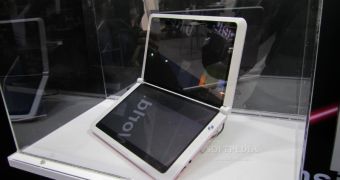With the iPad in full swing and many companies, including ASUS, HP and Dell, planning on joining the tablet war sooner or later, Micro-Star International (MSI) is also putting special effort into its slate-development plans, hoping to make a strong impression when it eventually unleashes its products. Unfortunately, while details on most upcoming slates have emerged, MSI kept rather silent about it. Now, with market watchers being who they are, a leak finally found its way to the web, providing some insight into the upcoming electronics.
The team over at Engadget claims to have uncovered some of MSI's plans for the upcoming third and fourth quarters. Apparently, instead of choosing between ARM and x86 chips, and consequently, between Windows and another OS, the company will act on both fronts. Specifically, in Q2, MSI will bring forth not just tablets running Android, but also models pre-loaded with Windows.
The exact number of models that the hardware maker is planning is not known for sure. Some details are known, however, including the screen sizes of 8.9 inches and ten inches, the hardware platforms and the OS. Some slates will be powered by NVIDIA Tegra 2 and will use the Android OS, whereas the Windows 7 models will be based on Intel Atom CPUs. Unfortunately, nothing is said of their feature sets, although the platforms suggest support for Flash and multitasking.
The other slate-type device that MSI is known to be working on, the dual-screen tablet that was on display at CES, has been delayed. According to the same report, two displays are proving to be quite power hungry, a fact that has, so far, prevented developers from squeezing more than roughly three hours of battery life. As such, instead of being presented in the third quarter, alongside the others, it has been pushed back to Q4.
There is still some good news, though. Engadget says that prices will be “extremely aggressive,” which means that the Android and Windows electronics should be far more affordable than the iPad, priced at $499. Consumers can expect to see the devices first-hand at Computex.

 14 DAY TRIAL //
14 DAY TRIAL //